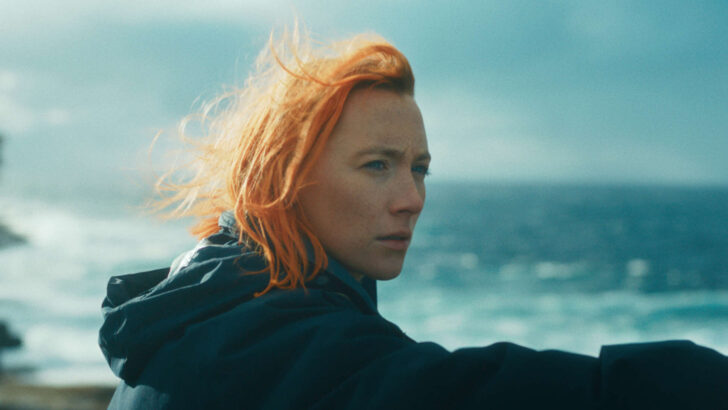A young woman wants to save the planet. But can she save herself?
Rona (Saoirse Ronan) is an alcoholic. The condition has cost her dearly. Friends have deserted her. Her boyfriend Deynin (Paapa Essiedu) has fled. She becomes a victim of violence.
She enters the 12-Step Programme to try and deal with her problem. For much of this incredible film it seems like it isn’t working. She lapses, changing her moods as often as she changes the colour of her hair.
Then comes the killer line: “I can’t be happy sober.”
The Outrun (15) isn’t an easy watch. At times it seems like recovery is beyond Rona. But ultimately the film utters a cathartic “Yea” to life. And to the richness of the human spirit.
Ronan is in every scene of the film. You can’t take your eyes off her. She makes everyone else look like holes on the screen. Her empathy with the character she plays is phenomenal.
She tries to recapture an innocence she took for granted in her youth in the Orkney Islands. Her face speaks volumes. The accent, as one might have expected, is pitch-perfect.
She talks to people without really talking to them, communicating monosyllabically. The lights are on but there’s nobody home. The isolation of the locale mirrors her predicament.
There’s an invisible lacuna in almost every conversation, the lacuna of lostness. The earplugs she wears can’t block out the sonic boom of life.
She travels from the hurly-burly of London to the wilds of Scotland, there finding some kind of tenuous tranquillity. She becomes at one with nature. She experiences the healing power of the sea.
She knows there’s no substitute for the “one day at a time” mantra. “It never gets easy,” a fellow sufferer tells her, “It just gets less hard.”
In investigations into marine biology and mythology she finds a new reason to go on. Her voiceover disquisitions on such themes, delivered almost laconically like some disembodied narrator, act like a corollary to the chaos in her head.
She delivers lambs. She talks about seaweed, corncrakes. She gets excited looking at the turgescence of waves.
Her mother (Saskia Reeves) tries to help her through prayer but can’t get through to her. Her father (Stephen Dillane) oscillates between cheeriness and dropping out. There are flashbacks to a time when life was simple, elemental, pure.
This is a must-see exploration of an age-old theme. It’s right up there with all the classic films on alcoholism: The Lost Weekend, Days of Wine and Roses, Leaving Las Vegas.
Nora Fingscheidt directs in a muted style, investing Amy Liptrot’s highly-acclaimed memoir – the two women co-wrote the screenplay – with a cerebral overlay. Scenes are threaded together in staccato fashion. A sense of dreaminess permeates.
People have been wondering for many years what film Ronan will get her Oscar for. Here’s a message for the Academy: Why wait until March? Just give it to her now. Okay?


 Aubrey Malone
Aubrey Malone Saoirse Ronan in a still from 'The Outrun'
Saoirse Ronan in a still from 'The Outrun' 